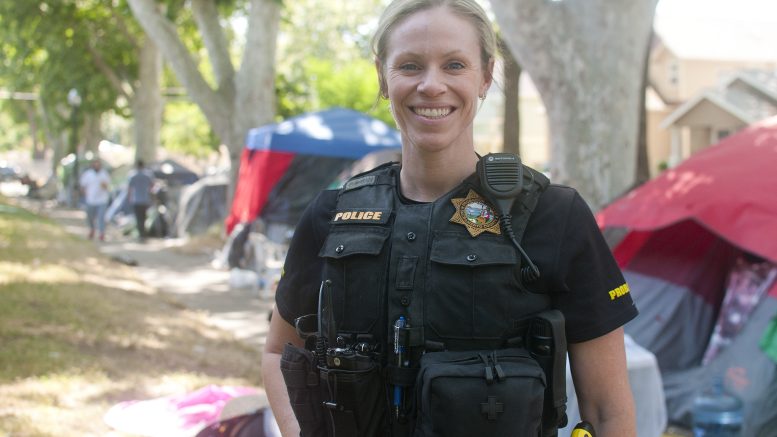Erin Burton, Deputy Probation Officer, is a five-year veteran with the Sacramento County Probation Department, where she is tasked with supervising unhoused probationers and serving as the homeless liaison for the department.
She recently spearheaded efforts to find out how many of the department’s clients are actually unhoused, mostly through old-fashioned boots on the ground: investigating and outreach within the homeless encampments throughout the Sacramento area. She was able to confirm about 2,000 probationers are toughing it out on the streets daily.
Ensuring these clients receive the resources and help they need from the probation department is not simple—and officers are often faced with serious challenges.
“Supervising unhoused probationers is time-consuming and can be quite difficult because they do not have an address or often even a phone number to reach them,” Burton explains. “We really have to be familiar with their encampments and individuals that live in them. With assistance from local law enforcement, we show up at places the unhoused congregate and are known to be. We talk to others who might know them, and familiarize ourselves with these encampments. It is really like trying to find a needle in a haystack. Connecting with that population and knowing how to approach and build rapport with them in their environment is crucial.”
To help these efforts, Burton wrote a proposal to her administrators to increase the department’s outreach, recommending a specific unit to focus solely on the unhoused clients that are in the system—a recommendation that is now moving forward. The aim is to connect people with programs to improve their life overall, including finding permanent housing.
Burton also says a $1.3 million grant was recently awarded to the department to produce “mobile probation vehicles” that will assist officers in the field. These newly funded vehicles will help probation officers like Burton better serve their unhoused clients.
“I just feel compelled to help these folks get back on their feet. I can feel the energy from some probationers who want to improve—and have the potential to improve—their lives. They just need the support to get there.”
Erin Burton, Deputy Probation Officer
Sacramento County Probation Department
And there are definitely success stories. As just one example, Burton was supervising a client who was a regular meth user and ex-sex worker, living on the streets. The client was referred to the Adult Day Reporting Center because she was experiencing difficulties during her probation sentence, and soon after, found out she was pregnant—and wanted to keep the baby.
Given her probationer’s situation and circumstances, it was critical Burton take quick action to help her get on the right path.
“I could feel she wanted to get her life back together and she showed initiative and desire to improve her life for not only herself, but for the sake of the baby,” Burton recalls. “I made arrangements for her to get into treatment with Systems of Care (for substance use) when she was about three months pregnant. A few days before she was due to enter into the program, the COVID shutdowns started and she was not able to start the program. Knowing that it was important to get her care, I called that place and went there week after week for updates. I was especially nervous and holding my breath because every day I worried about her being out on the street while in the middle of a pregnancy. Finally, when the lockdowns began to be lifted after almost two months, we were able to get her into treatment.”
Burton says her client eventually got clean and off drugs, had the baby and was connected to a transitional living program. She was able to finish her probation sentence and have a fresh start with her new baby. The two women are still in contact and her former probationer is now employed as a house manager in a sober living home.
Burton takes pride in helping this vulnerable population. While she believes people should be held accountable for criminal acts, she finds assisting clients who are actually trying to improve their lives is beneficial not only to them, but the entire community as a whole.
“I just feel compelled to help these folks get back on their feet,” says Burton. “I can feel the energy from some probationers who want to improve—and have the potential to improve—their lives. They just need the support to get there.”


























